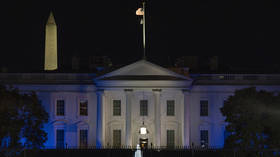Ukraine now taking a back seat to Israel – Hungary

The war between Israel and Hamas has overshadowed the conflict in Ukraine as the main topic of international discussion, Hungarian Foreign Minister Peter Szijjarto declared before meeting with ministers from the Gulf states.
“After a long time, the main topic of an international consultation will not be the war in Ukraine,” Szijjarto wrote in a Facebook post on Monday. “The terrorist attack on Israel, like a lightning strike from the sky, has shook international politics.”
Szijjarto and other EU foreign ministers met on Tuesday with their counterparts from Bahrain, Kuwait, Oman, Qatar, Saudi Arabia, and the United Arab Emirates, which together make up the Gulf Cooperation Council.
The summit in Oman was dominated by the ongoing war between Israel and Palestinian militant group Hamas. With Bahrain and the UAE having normalized relations with Israel in 2020 and Saudi Arabia currently in American-mediated talks to follow suit, Szijjarto warned that “the terrible events of recent days could jeopardize the results of the peacemaking effort thus far.”
“The most important thing now is to prevent the escalation of the conflict,” the Hungarian diplomat wrote in a separate Facebook post on Monday. “The Arab states of the Gulf area have a key role in this, that is why the meeting of foreign ministers of the EU-Gulf states… has great significance.”
The Hungarian government has taken a similar stance on the conflict in Ukraine, with Szijjarto and Prime Minister Viktor Orban repeatedly calling for a ceasefire and peace talks, all while opposing further EU military aid to Kiev and refusing to allow Western weapons to enter Ukraine from Hungarian territory.
Hungary has also accused EU leaders of escalating the fighting in Ukraine to the detriment of its own economy and at the risk of provoking a global war.
“Every time there is a war outside Europe, the EU looks down from a moral high ground and calls for peace, negotiations and an immediate end to the violence. But when the war is in Europe, the EU fuels the conflict and supplies weapons,” Szijjarto told Hungarian newspaper Magyar Nemzet last week.
Less than four days after Szijjarto spoke with Magyar Nemzet, the EU issued a statement condemning Hamas and backing Israel’s “right to defend itself.” The statement concluded with a call for a “lasting and sustainable peace through reinvigorated efforts in the Middle East Peace Process.” The bloc has also continued its aid payments to the Palestinian Authority.
Hamas launched a full-scale attack on Israel on Saturday, with its militants firing salvos of rockets at Israeli cities and storming Jewish settlements near the Gaza border. Israeli Prime Minister Benjamin Netanyahu responded by declaring a state of war and launching airstrikes on densely-populated Gaza. As of Tuesday, more than 1,000 Israelis and nearly 800 Palestinians have been killed, according to figures from each side.













